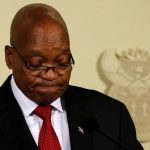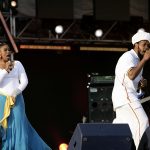Political songs | Mogaetsho – Bokani Dyer
Bokani Dyer is ‘looking to speak truth’ in his music and is willing to continue the tradition of challenging South Africa’s leaders when they stray or betray, as he does in Mogaetsho.
Author:
31 January 2020

It was a speech that may have helped put a target on his back. This is how USA Today newspaper columnist Afi-Odelia Scruggs described the courageous address that Dr Martin Luther King Jr gave on 4 April 1967, exactly one year before his assassination.
By describing how the dream he once cherished had become a nightmare, King took a powerful but lonely stand that day against the destructive war his country was waging in Vietnam as he addressed the Clergy and Laymen Concerned About Vietnam organisation at the Riverside Church in Manhattan, New York.
The United States had been in active combat in Vietnam for two years and tens of thousands of people had been killed, including about 10 000 American troops. The political establishment backed the war and more than 400 000 American service members were in Vietnam, putting their lives on the line at a time that intersected with the Cold War.
As the New York Times columnist Michelle Alexander wrote recently, many of King’s strongest allies urged him to remain silent about the war. “They knew that if he told the whole truth about the unjust and disastrous war,” she explained, “he would be falsely labelled a communist, suffer retaliation and severe backlash, alienate supporters and threaten the fragile progress of the civil rights movement.”
But King was unequivocal in damning the war.
“I come to this magnificent house of worship tonight because my conscience leaves me no other choice,” he started his speech, which was titled “Beyond Vietnam: A Time to Break the Silence”. “I join with you in this meeting because I am in deepest agreement with the aims and work of the organisation which has brought us together: Clergy and Laymen Concerned about Vietnam.
“The recent statement of your executive committee are the sentiments of my own heart and I found myself in full accord when I read its opening lines: ‘A time comes when silence is betrayal.’ That time has come for us in relation to Vietnam.”
Firestorm of criticism
The speech unleashed a firestorm. It was fine to speak out for civil rights, but don’t criticise America’s “destruction of Vietnam”, to use King’s words. The New York Times castigated King, saying that his “strategy of uniting the peace movement and civil rights could very well be disastrous for both causes”. Even the black press and the National Association for the Advancement of Colored People criticised King for taking a radical, pro-peace stance.
One of the people Scruggs interviewed was Rozell “Prexy” Nesbitt, a long-time activist who worked with King and now teaches African history at Columbia College in Chicago. Nesbitt is convinced the speech was the final straw for people who were determined to kill King. He was ultimately shot to death by James Earl Ray on 4 April 1968.
Nesbitt said: “The racists were saying, ‘That going too far. Now he’s gonna tell us how to run our country. Who does he think he is?’”
During the struggle against apartheid, a number of South African jazz musicians said, like King, that “silence is betrayal”. Many, in the country and in exile, broke the silence and played and spoke out against the injustices of the racist system. Many, too, continue to alert us to the disturbing and distressing realities of the South African present.
Related article:
While apartheid has been officially over for almost 26 years, its legacy continues in many shapes. The country has had to contend with the kinds of leadership mired in former president Jacob Zuma’s reign of kleptocracy and the public- and private-sector corruption that has cost South Africa as much as R1 trillion. And it hasn’t stopped yet.
Questions of housing for impoverished people still remain. Children attend crumbling schools. Clinics implode in public health. Survival, for many South Africans, is a constant question. South Africa’s dream, like King’s, has faded to a stark reality.
Addressing betrayal
It is encouraging that one of the country’s top young jazz musicians, Bokani Dyer, is willing to continue the lofty tradition of challenging the country’s leaders when they stray or betray, even though it is easy and convenient not to speak out. The pianist, who was born into a family in political exile in Botswana 34 years ago and moved to South Africa in 1990, isn’t keeping silent. The most recent result is a powerful song called Mogaetsho in which he addresses betrayal, this time the betrayal of our country by its leaders.
“Mogaetsho is a Setswana word that does not have a direct English translation,” says Dyer. “The closest translation is probably ‘my fellow man’, but the meaning is deeper than this, meaning ‘person from home’ or ‘person who is of us’. This makes the sense of betrayal in the message stronger because you are referring to a leader as someone from home: ‘Go rileng, Mogaetsho (What is happening/wrong Mogaetsho)?’.”
Dyer says he has “noticed as a trend when people are given positions of power” that what follows are “many empty promises and a loss of commitment to the ideals which got them into their positions”.
The superb seven-piece band that plays on Mogaetsho recalls adventurous jazz greats such as the Art Ensemble of Chicago, Sun Ra and Pharoah Sanders. As one of the most exciting songs to come out of the thriving South African jazz scene, it is bluntly political, too.
Related article:
“This song is dedicated to our leaders. Those leaders who seem to love us only when they need us…” starts its searing spoken word intro with echoes of Hugh Masekela and Fela Kuti behind their respective microphones.
Radio Sechaba
Mogaetsho will be included on a new album planned for release in the South African winter, titled Radio Sechaba. “‘Sechaba’ means ‘Nation’ in Setswana,” says Dyer. “My idea around this album is to create a listening programme for the nation-builder. I want to shed light on issues we face as a nation. The motivation is to encourage active citizenry and to invest in a brighter future in a country that has tremendous potential.”
Dyer is optimistic that music can make a difference in politics and society.
“Music is a powerful medium, which can direct a force of energy in a particular direction. Songs accompany every part of life, especially in African culture, so I believe they are an integral part. Whether the song itself is the primary agent of change, I don’t know … but I do believe the songs serve to inspire and align people’s consciousness.”
The musician is not worried that the overtly political Mogaetsho will discourage radio stations from playing it or that venues will not invite him to play there. “I feel that the message is relevant for South Africa today and I believe the message will resonate with many. I am looking to speak truth in my music so if that loses me some gigs, then so be it.”


